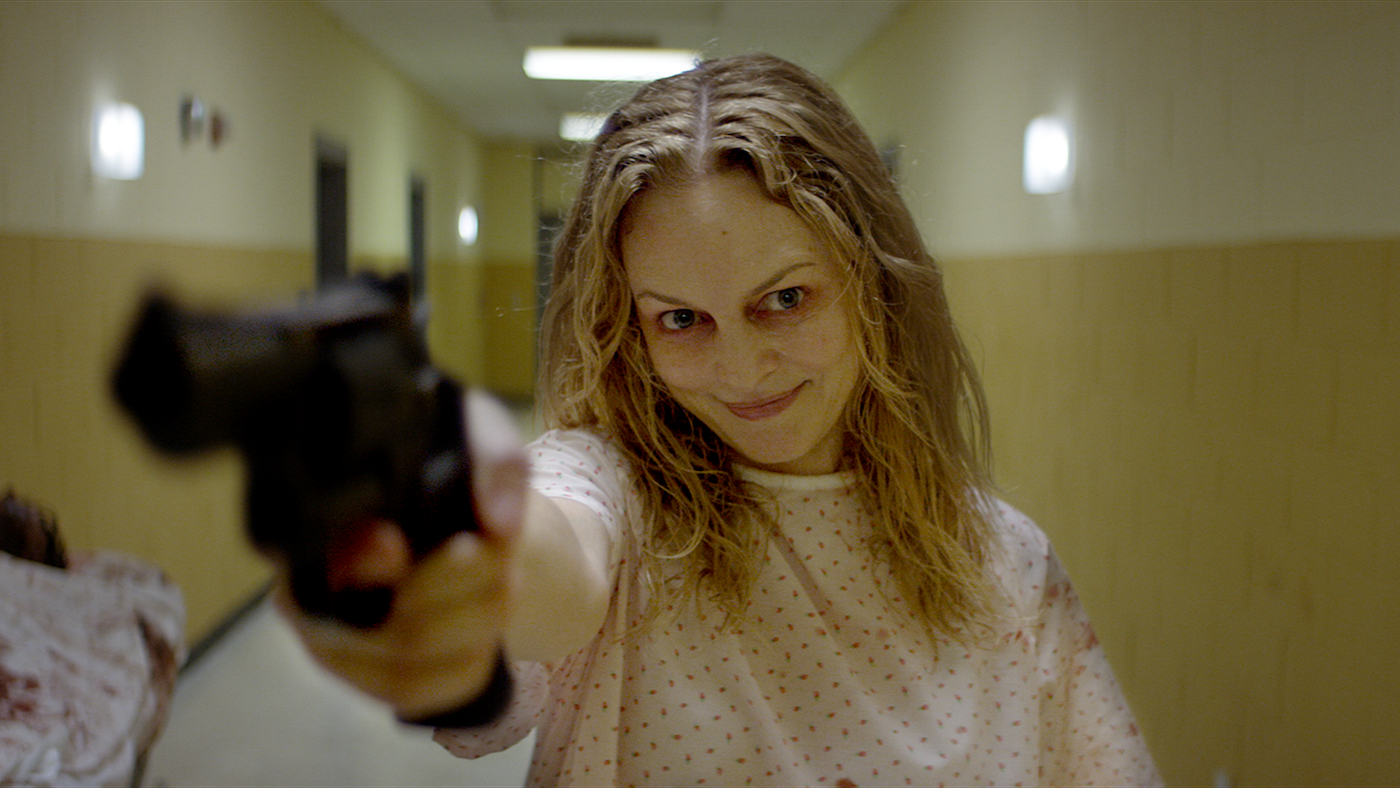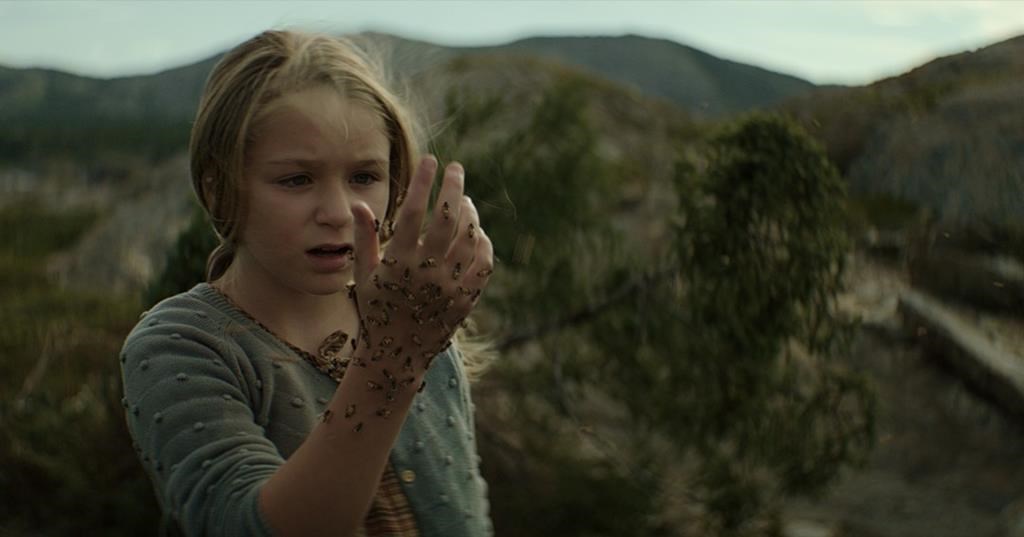Reviews
‘Suitable Flesh’ Tribeca Review – Joe Lynch Pays Tribute to Stuart Gordon in Beguiling Lovecraft Tale

The spirit of Stuart Gordon is alive and well in Joe Lynch’s Suitable Flesh. The adaptation of H.P. Lovecraft’s “The Thing on the Doorstep,” written by Dennis Paoli (Re-Animator, From Beyond, Dagon), and produced by Brian Yuzna and Barbara Crampton, seamlessly inserts itself into Gordon’s Lovecraftian cinematic world from its opening scene set in a hospital that’s instantly evocative of Re-Animator. Lynch captures the humorous, oft-sexy tone of Gordon’s ‘80s/’90s Lovecraftian horror output while putting his own stamp on it through keen instincts and modern storytelling.
Psychiatrist Dr. Elizabeth Derby (Heather Graham) had it all; a doting husband in Edward (Johnathon Schaech), an enduring friendship with colleague Daniella Upton (Crampton), and a successful career. That changed the moment young Asa Waite (Judah Lewis) crashed into her life as a troubled patient suffering from an extreme personality disorder. Or does he? Asa claims that something’s possessed his father, Ephraim (Bruce Davison), and now it’s on the hunt for suitable flesh. The more Dr. Derby finds herself drawn to Asa’s plight, the more insane her story becomes in this obsessive tale of desire, lust, and body-hopping madness.

Fans of Lovecraft will find a treasure trove of Easter eggs to mine here. Still, it’s the way that Lynch seamlessly inserts Suitable Flesh into the same conversation as Stuart Gordon’s Lovecraft adaptations that most impresses. There’s painstaking attention to detail from the opening frame. It’s not just settings or characters that call back to the late Gordon’s memorable horror films, but aesthetics, tropes, and everything in between. Lynch brings the ‘90s penchant for soft lighting and saxophone music into the present for his erotic horror thriller and pays tribute to stalwart horror tropes like the sandwich-eating hospital morgue attendant (played by Graham Skipper, who played Herbert West in Re-Animator: The Musical).
While Suitable Flesh frequently looks and feels like a Stuart Gordon movie, Joe Lynch distinctly makes it his own by injecting a very different flavor of horror along with the innovative instinct to gender-flip the original Lovecraft story. Whereas Re-Animator and From Beyond embraced slime, goop, and gore, Suitable Flesh fixates on obsession and a psychological unraveling that gives the cast much to sink their teeth into. Heather Graham shines as the unwitting psychiatrist thrust into a dizzying quest to clear her name, channeling every personality in the process as Elizabeth Derby becomes untethered to her own skin. Graham and Judah Lewis aren’t just pulling double duty here; they’re tasked with taking on multiple roles in quick succession.
Johnathon Schaech brings levity as the gender-flipped doting housewife, and Barbara Crampton brings the emotional center through Daniella’s affecting friendship with Elizabeth. It’s an actor’s showcase as much as a nostalgic return to Gordon’s horror, and their chemistry ensures rooting interest.

Suitable Flesh makes for a more self-contained story, more interested in its characters and the consequences of body-hopping mayhem over visceral cosmic terrors. That’s not to say that Lynch doesn’t dole out grotesque violence, however. But Lynch pays tribute to a horror master through meticulous detail while avoiding a complete retread, ensuring Suitable Flesh may feel familiar, but it’s also unafraid to take unexpected detours or eschew outdated tropes. Lynch’s reverence for Gordon never exceeds his voice, blazing a thrilling path forward for a newer generation carrying the torch of horror masters. It results in a strange, beguiling horror effort that feels retro and new, capturing the essence of both Gordon and Lynch all at once.
Suitable Flesh made its World Premiere at the Tribeca Film Festival and will release later this year.


Reviews
‘The King Tide’: An Island Town Rots with Moral Decay in Canadian Folk Horror Fable [Review]

The opening scenes of director Christian Sparkes’ The King Tide set an ominous tone: a powerful storm takes down the power lines of a small island town as a pregnant woman loses her child while her dementia-suffering mother sits nearby. In the morning, as the town takes stock of the damage and the power is restored, a surprising discovery is found in an overturned boat in the harbour: a baby girl…with the ability to heal.
Writers Albert Shin and William Woods, working from a story by Kevin Coughlin and Ryan Grassby, treat the story as something of a morality tale mixed with a fable. Following the cold open, the action jumps ahead 10 years at a point when the unnamed island (the film was shot in Newfoundland, Canada) is thriving. The fishing is bountiful, the islanders are self-sufficient and have cut ties with the mainland, and most everyone is happy.
As characters are prone to saying, it’s all thanks to Isla (Alix West Lefler), the miracle baby who has grown up worshipped by the islanders. While Mayor Bobby Bentham (Clayne Crawford) and his wife Grace (Lara Jean Chorostecki) endeavor to raise Isla like any other little girl, the reality is that the island’s entire ecosystem revolves around her miraculous powers. It is only because of Isla that they survive; every aspect of their lives – from medicine to food – relies on her.
Each day the citizens line up for their allotted time with the young girl – be it to stave off breast cancer, like Charlotte (Kathryn Greenwood), or recover from another night of heavy drinking like former doctor, Beau (Aden Young). There’s even a predetermined schedule for when she will go out on the boats and use her power to lure fish into the nets.

One fateful day, Bobby succumbs to peer pressure and alters Isla’s schedule at the last minute to accompany cod fishermen Marlon (Michael Greyeyes) and Dillon (Ryan McDonald). A childish game with fatal consequences is played, but with Isla indisposed, a young boy, who would have otherwise been fine, dies. And while the rest of the community grieves, it is Isla who is completely shaken and, unexpectedly, loses her powers.
Suddenly the entire balance of the island is thrown off. Folks like Grace’s mother, Faye (Frances Fisher), who relied on Isla to keep her dementia at bay, suddenly reckon with mortality, while the food security of the town is called into question. Faye’s late-night “support group” meetings take on an urgent and secretive tone and the townspeople claim ownership of Isla’s time despite Bobby and Beau’s protests that she needs rest to recover from her trauma.
Like the best thrillers, the politics and personalities within the community come into play as morals are compromised and the good of individuals vs the collective is played out in increasingly desperate situations. The King Tide excels because it is interested in exploring the competing motivations of the townspeople, while also resolutely refusing to paint anyone as inherently good or bad. These are desperate people, determined to remain independent and free from outside interference, while protecting their trapped-in-amber way of life.

These developments work because there’s a humanity to the characters and The King Tide wisely relies heavily on its deep bench castoff character actors to drive the conflict. Crawford is the de facto protagonist of the ensemble and he’s also the most straightforward character: Bobby is a good man and a loving father, but he’s no white knight. At several points in the film, his willingness to acquiesce to the demands of the community and retain his power causes events to spiral further out of control.
Even more fascinating are Grace and Faye, two commanding women whose capacity for maternal love is matched – or eclipsed – by their own self-interests. A mid-film discovery about Isla’s power reframes Grace’s priorities, ultimately pitting her against her husband. As a result, Grace is incredibly compelling and frustrating (in a good way) and Chorostecki, who has done great genre work on both Hannibal to Chucky, plays the moral ambiguity exactly right. Grace is a fascinating and flawed human character in a film filled with them.
The same goes for Fisher, who deftly balances Faye’s grandmotherly love for Isla with the needs of the community and, by extension, her own health demands. In the hands of a lesser performer, it would be easy to hate Faye for her actions, but Fisher’s performance perfectly captures the fierce determination and fear that drives the island’s matriarch.
Finally, there’s Aden Young, The King Tide’s secret weapon. The ten-year jump reveals that Beau has undergone the most significant transformation: while everyone else has benefitted from Isla’s powers, her presence has eliminated the need for a doctor. With the clinic effectively shuttered, Beau has become an alcoholic; a shell of his former self with no purpose.
Like Bobby, Beau is the easiest character to root for because of his selfless desire to protect Isla, but Young (renowned for his work with Crawford on Rectify) unlocks the character’s tragic pathos and, in the process, becomes the film’s emotional anchor.

Framing the moral decline of the islanders and anticipating the unexpectedly devastating climax is the natural beauty of Newfoundland. As shot by cinematographer Mike McLaughlin, there’s a steely beauty to the geography, resplendent with rocky cliffs, pounding surf, and gusty bluffs that reinforce the islanders’ isolation.
There’s a fierce pride in their struggle to survive independently, evident in the simple lodgings and the antiquated alarm bell that is rung whenever fishing ships from the mainland stray too close. It’s a chilly, atmospheric calling card for one of the most picturesque provinces in Canada, but it is a perfect complement for the folk horror narrative.
Armed with serene, beautiful cinematography, murky moral developments, and a deep bench of talented character actors, The King Tide is a quiet gem that demands to be seen. It’s one of the year’s best genre films.
The King Tide is in theaters April 26, 2024.














You must be logged in to post a comment.